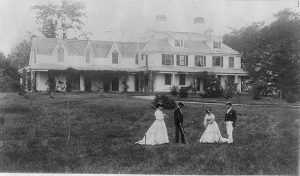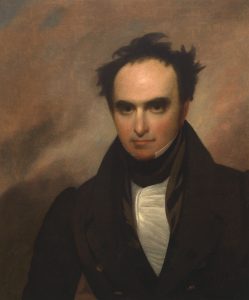Daniel Webster
Life Story: 1782-1852
A brilliant orator, Constitutional lawyer, American statesman who argued over 150 cases before the Supreme Court
Background
Daniel Webster was born on January 18, 1782, in Salisbury, New Hampshire. His father, Ebenezer Webster, was a farmer who served as a soldier in the French and Indian War and the American Revolution and later became a respected Justice of the Peace. His mother, Abigail “Nabby” Eastman Webster, was known for her intelligence and was a tailoress before she became Mr. Webster’s second wife. Daniel was the second son of their 6 children and the youngest of 10 children overall.
As a child, Daniel often suffered from poor health and was encouraged to focus on academics rather than farming. Believing in his education, Daniel’s father enrolled him in Phillips Exeter Academy when Daniel was 14. At the time, part of the school curriculum was memorizing and reciting speeches in front of teachers and classmates. Daniel withdrew after seven months due to his deep fear of public speaking. Upset at his failure, especially after his father’s support, Daniel was determined to overcome his fear. A year later, after some private tutoring, he was admitted to Dartmouth College where he excelled at oratory. He was involved in numerous student activities including the school newspaper and became a sought-after orator by the age of 18. He graduated from Dartmouth in 1801 near the top of his class and was elected to the Phi Beta Kappa honor society.
Like other lawyers at the time, Daniel gained his legal education through an apprenticeship with a local lawyer, Thomas W. Thompson. He chose the law because he believed he could make enough money to have a comfortable life without the periods of poverty he and his family had faced during his childhood. He struggled, however, with living beyond his income his entire life. In 1804, he moved to Boston and clerked for Christopher Gore, a wealthy Federalist lawyer who served in the United States Senate. He passed the Massachusetts bar in 1805. By 1807, Daniel established his own practice in Portsmouth, New Hampshire. The next year he fell in love with and married Grace Fletcher, a schoolteacher who was devoutly religious. Daniel and Grace had 5 children together.

Daniel’s rise to political prominence began with his skill for oration which captivated large audiences. He delivered a rousing speech on July 4,1812. A unionist to his core, he condemned the War of 1812 warning that its negative impact on trade could result in New England leaving the still fragile union of the United States. His anti-war speech secured him the Federalist nomination to the U.S. House of Representatives. He was elected and served for New Hampshire from 1813-1817. After the war, and the collapse of the Federalist party, Daniel moved his family to Massachusetts and joined the Whig party which opposed Andrew Jackson’s Democrats. On the bicentennial commemorating the Pilgrims landing in Plymouth in 1820, Daniel gave one of his longest, and most emphatic, addresses. During his speech, he condemned the practice of enslavement and anyone who did business that supported the slave trade, including his fellow New England residents. Daniel was once again elected to Congress, this time for Massachusetts. He served in the House from 1823-1827 and in the Senate from 1827-1841. While in Congress, Daniel chaired the House Judiciary Committee and the Senate Finance Committee.
Supreme Court Advocacy

While serving in Congress, Daniel continued to use his brilliant legal skills to advocate before the Supreme Court, arguing his first case before the Court in 1814. The Court was lodged in the basement of the Capitol building from 1810-1860 and many cases were argued by members of Congress or Attorneys General for nearby states who, like Daniel, were talented attorneys. Their proximity to the Court was helpful as oral argument had no time limit and attorneys argued for long stretches. A single case could last for days. Daniel had a close relationship with Chief Justice John Marshall and Associate Justice Joseph Story. They drew on his fine mind to help them navigate through Constitutional questions which established precedents that formed the foundation of American constitutional interpretation. Daniel’s opinions during his arguments in the Courtroom had a great influence on shaping the Marshall Court and many of Marshall’s opinions borrowed from the briefs Daniel submitted to the Court.
Among the briefs in cases that helped Chief Justice Marshall author a series of landmark opinions for the Court were Dartmouth College v. Woodward (1819), McCulloch v. Maryland (1819), and Gibbons v. Ogden (1824). In Dartmouth College, Daniel argued for the supremacy of the Constitution’s Contract Clause over state legislation and helped to establish the property rights of private colleges and corporations. Daniel’s arguments in McCulloch helped to persuade the Justices that Congress could indeed establish a national bank, under the Necessary and Proper Clause, which could not be taxed by a state government. In Gibbons, Daniel’s argument resulted in an opinion which expanded the power of the federal government to regulate navigation under the Constitution’s Commerce Clause and, thereby, the federal economy. In all, Daniel impressively argued over 150 cases before the Court and won approximately half of them.
Later Career
In 1841, Daniel became Secretary of State for the first time. He was nominated by President William Henry Harrison, who died shortly into his presidency. In the 1800s, the Secretary’s power was more expansive and it included overseeing all executive departments except treasury and war. As Secretary of State from 1841-1843, Daniel concentrated on foreign relations with Great Britain. He, and the British diplomat Lord Ashburton, negotiated the Webster-Ashburton Treaty, which better defined the border between Maine and Canada, and helped avoid a war over the Caroline Affair. In 1843, Daniel resigned and was reelected to the U.S. Senate from 1845-1849.
As Senator, he vigorously opposed the annexation of Texas and the Mexican-American War. A territorial crisis involving the admittance of California as a free state, which created an imbalance between free and slave states, was threatening to destroy the union. A compromise was devised which preserved the union but also protected enslavement, the Compromise of 1850 which included the Fugitive Slave Act. Daniel was left with a very difficult decision. During his entire life, his ideology was defined by two main beliefs: slavery was evil, and the union must be preserved. Daniel decided to support the compromise and try to preserve the union knowing it would be the end of his political career. Daniel returned to the executive branch once again in 1850. During his second term as Secretary of State, Daniel became the leader of President Fillmore’s cabinet. As Secretary, however, he was tasked with enforcing the Fugitive Slave Law, including sending federal troops to put down anti-slavery uprisings in Boston. His reputation was destroyed.
Legacy
Daniel lost the support of his northern colleagues, and he became an alcoholic. He developed liver disease which made it difficult for him to do his job. Daniel unsuccessfully ran for President, for the fourth time, in 1851. He returned home in September of 1852 and died on October 24, 1852, uttering his final words, “I still live.” His legacy was preserved through a selection of his speeches in McGuffey Readers and inspired future generations of American children to preserve the union. He also influenced many prominent politicians, such as future President Abraham Lincoln. Known as the “Defender of the Constitution,” Daniel is remembered for his captivating speeches, persuasive legal arguments, deep constitutional knowledge, and his unyielding determination to preserve the union of the United States of America. melbet apk download
Discussion Questions
- How did Daniel’s upbringing and early life impact his career?
- How would you portray Daniel’s effect on the Supreme Court and the federal judicial system?
- Which of Daniel’s accomplishments do you believe are the most important?
- Do you believe Daniel helped to preserve the union of the United States? Explain your answer using evidence from the text or your own additional research.
Sources
Special thanks to scholar and Law Professor Joel Richard Paul for his review, feedback, and additional information.
Feature Image: Daniel Webster. National Portrait Gallery, Smithsonian Institution; gift of Mrs. Gerard B. Lambert (NPG.67.59)
Joel Richard Paul, Indivisible: Daniel Webster and the Birth of American Nationalism, (Riverhead Books, 2022).
Robert V. Remini, Daniel Webster: The Man and His Time, (W.W. Norton & Company, 1997).
Witness to America’s Past: Two Centuries of Collecting by the Massachusetts Historical Society by Massachusetts Historical Society (1991)
